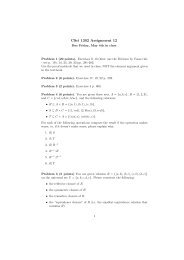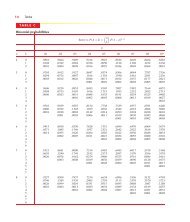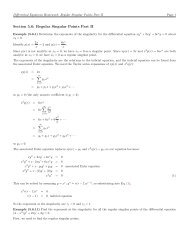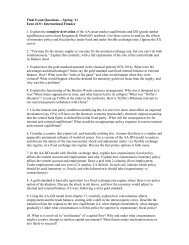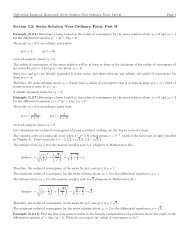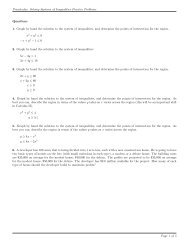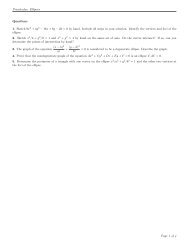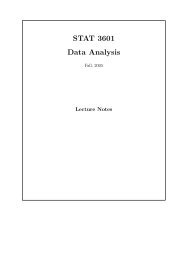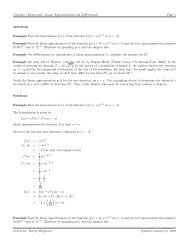Designing Efficient Snow Plow Routes - University of Minnesota
Designing Efficient Snow Plow Routes - University of Minnesota
Designing Efficient Snow Plow Routes - University of Minnesota
Create successful ePaper yourself
Turn your PDF publications into a flip-book with our unique Google optimized e-Paper software.
instructor was the only person who graded written reports, while the oral presentations were<br />
evaluated by all who attended. Attributes used on the evaluations <strong>of</strong> the written and oral<br />
presentations included how well students communicated the mathematical ideas, how well they<br />
demonstrated their content knowledge <strong>of</strong> their research project, the level <strong>of</strong> independent and<br />
critical thinking skills, clarity and organization, and enthusiasm. Each student within a group<br />
received the same grade on the project.<br />
The Good News and the Challenges<br />
In this section, we will briefly discuss a few rewards and challenges that we faced during the<br />
semester when we incorporated service-learning into Discrete and Combinatorial Mathematics. It<br />
is common for us to run into a few obstacles whenever we try to add a new aspect into our<br />
pedagogical styles, which we are very familiar and comfortable with. Since the idea <strong>of</strong><br />
incorporating service-learning into our curriculum was a rather unfamiliar concept especially in<br />
the mathematical sciences, it was only natural that this was a challenging experience with a<br />
rather steep learning curve. Notwithstanding the challenges, we found the outcomes <strong>of</strong> the<br />
project to be beneficial to the students, instructor, the university and the community.<br />
The Good News<br />
A former Vice-Chancellor for Academic Affairs and Dean <strong>of</strong> the <strong>University</strong> <strong>of</strong> <strong>Minnesota</strong>,<br />
Morris once said, "The math project on designing efficient snow-plow routes for the city is a<br />
poster child for service-learning projects." This project has a strong academic component as well<br />
as a service component.<br />
From an academician's view point, we found that doing service-learning projects has<br />
benefits that cover our mantras <strong>of</strong> excelling in teaching, research and service. In terms <strong>of</strong><br />
teaching, a hands-on and real-world application <strong>of</strong> the mathematical theory covered in class<br />
provides a motivational tool for the instructor. Being able to work on a modeling problem in<br />
which you have direct contact with all the raw data and the people using it, is definitely<br />
refreshing, albeit challenging; thus it complements working on relatively simple textbook<br />
problems. While the process <strong>of</strong> solving the problem is going on, we noted additional research<br />
questions such as "what model would fit with extra constraints, i.e. what if there must be<br />
sequential execution <strong>of</strong> different machines?" and "can we decompose the graph into simple<br />
cycles so that we are guaranteed to cover each block in two <strong>of</strong> the cycles?" The first question is a<br />
modeling one while the second is more <strong>of</strong> a basic research question in graph theory. Last but not<br />
least, this project clearly is <strong>of</strong> service or outreach value to the community we reside in.<br />
From the students' perspectives (which were obtained via written student evaluations at<br />
the end <strong>of</strong> the course), in addition to the mathematical content learned, they felt a sense <strong>of</strong><br />
gratification and empowerment, knowing that what they did actually made a difference to the<br />
community they lived in or will live in for at least four years. Students were able to get a taste <strong>of</strong><br />
being in the role <strong>of</strong> applied mathematicians and as valuable members <strong>of</strong> a research team. In<br />
addition, students had first hand experience in dealing and communicating with nonmathematicians<br />
and non-academicians; they learned what questions to ask and how to identify<br />
useful information that is pertinent to their project. Indeed, a few years after their graduation,<br />
students gave us unsolicited comments on how they used this experience in their careers, where<br />
they <strong>of</strong>ten work on group projects and as pr<strong>of</strong>essional consultants.<br />
In terms <strong>of</strong> the benefits to the university and the community, service-learning projects<br />
like this one provide opportunities to bring together some <strong>of</strong> the needs/problems <strong>of</strong> the



